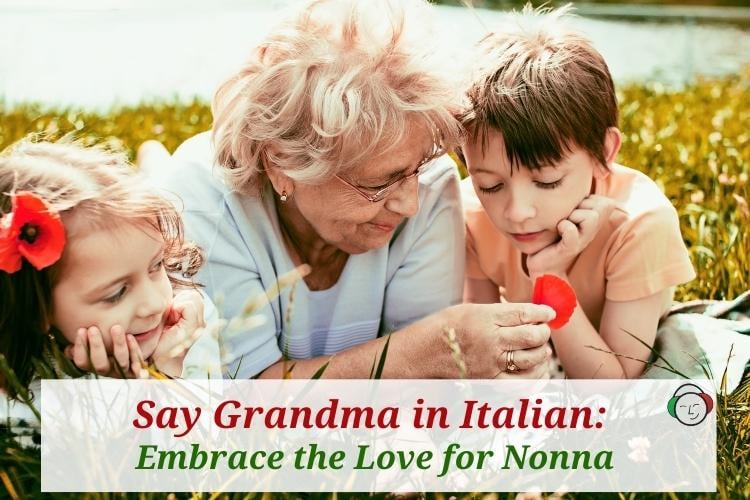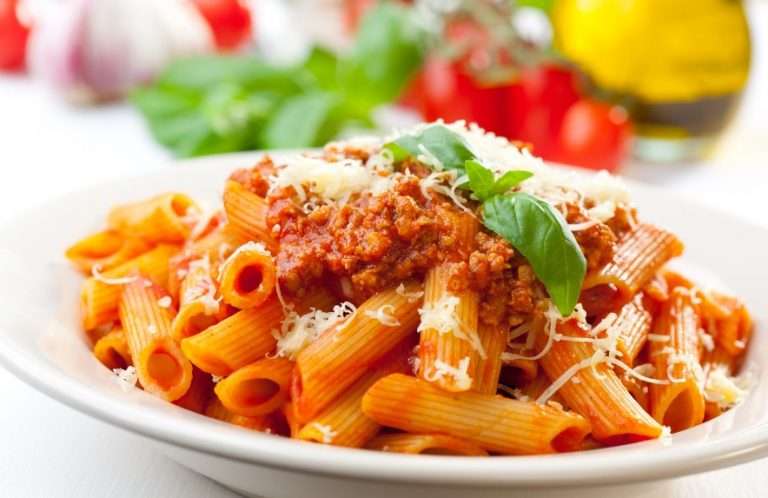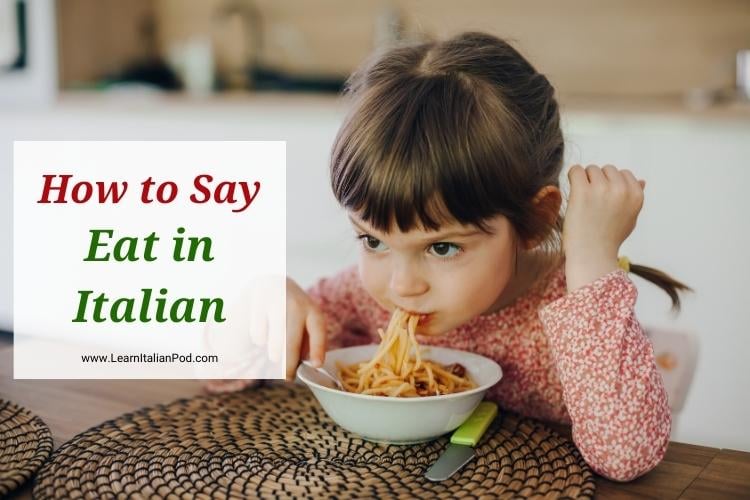Say Grandma in Italian: Embrace the Love for Nonna
The vibrant Italian culture cherishes the essence of family, celebrating grandmothers – nonnas – with a blend of reverence and adoration. As we dig into the world of Italian grandma names and learn how to say grandma in Italian, we discover many traditional names that underline just how loved these grandmothers are.
This journey introduces us to the rich tapestry of traditions that bind Italian grandmother names to the heartstrings of the family.
Whether you’re seeking the perfect name to call your nonna or want to understand the cultural significance behind a popular name, our exploration spans affectionate phrases, regional variations, and much more.
Join us as we unveil the richness of the Italian language and its profound homage to grandmothers.
Italian Grandma Names: A Variety of Terms for Italian Grandmothers

Italian grandmothers are affectionately addressed by many names, embodying their integral role in the family. These names can differ based on the emotions they stir and the relationship shared. Let’s look at some of the most frequently used terms:
Nonna: Grandmother, Grandma
The Italian term “Nonna” denotes an Italian grandmother and is Italy’s most popular grandma name. Below are some Italian phrases translated into English to illustrate this:
- Nonna, ti voglio bene fino alla luna e ritorno. (Grandma, I love you to the moon and back.)
- La nonna fa la pizza migliore del mondo. (Grandma makes the best pizza in the world.)
Nonna Paterna & Nonna Materna: Paternal and Maternal Grandmothers
In Italian, there are more precise ways to distinguish your grandmother based on her lineage. Let’s see how to differentiate between paternal and maternal grandmothers with the words “paterna” and “materna“.
- La mia nonna materna è un’esperta di opera lirica. (My maternal grandmother is an opera expert.)
- La mia nonna paterna viene da Napoli. (My paternal grandmother comes from Naples.)
Suggested Reading: 10 Italian Mother’s Day Quotes That Will Touch Your Heart
Expressions of Love for Italian Grandmas
In a culture where family ties run deep, terms of endearment are generously employed, particularly when addressing grandparents. Younger generations connect uniquely with their nonnas, using alternative names to express their love and respect.
Italians often attach suffixes to “nonna” and “nonno” when talking about and to their grandparents to create a term of endearment and articulate their love.
Some common suffixes include “-ina” and “-uccia” While these words might seem quirky in their pronunciation, they express endearment, and Italians relish using them.
Let’s examine some popular ways to address grandma in Italian.
Nonnina (Little Grandmother)
A cute name for “nonna” in Italian. The literal meaning is “little grandmother.”
- Nonnina mi ha insegnato a cucire. (Nonnina taught me how to sew.)
Nonnuccia (Sweet Grandmother)
This is a unique grandma name, a sweet term for an Italian grandmother.
- Nonnuccia mi faceva sempre il cioccolato caldo quando faceva freddo. (Nonnuccia always made me hot chocolate when it was cold.)
Suggested Reading: Top 400 Italian First Names with English Meanings
Regional Variations of Nonna

Italy, a country steeped in regional diversity, exhibits this richness through its many dialects – including the various special names for “grandma” used nationwide. This linguistic diversity is a testament to the vibrancy of Italian culture, making your knowledge of grandparent names more culturally nuanced and fascinating.
While “Nonna” is universally recognized and cherished, regional dialects have birthed a variety of traditional choices for grandma names. Here’s a snapshot of some of these regional designations:
- In the vibrant region of Calabria, you may hear the term ‘Nanna.’
- In the scenic landscapes of Piemonte, ‘Granda‘ might be used.
- If you find yourself in Veneto or Emilia-Romagna, ‘Nona‘ is commonly used.
- Venturing into the island of Sardegna, the term ‘Ajaja‘ or ‘Jaja‘may be heard.
- And finally, in the culturally rich region of Sicilia, ‘Ava‘ is a familiar term.
Remember, these regional variations lend a rich and unique texture to Italy’s diverse heritage. By using these names, we honor our grandmothers and keep Italy’s vibrant regional cultures alive.
Nonna Powerhouse: Celebrating Notable Italian Grandmothers in the Public Eye
In the panorama of influential Italian figures, numerous are the women who’ve not only embraced the role of “Nonna” or grandmother, but have also continued to shine in their respective professions. These trailblazing Italian grandmothers defy stereotypes, demonstrating that age doesn’t limit one’s ability to contribute meaningfully to society.
One great example is Sophia Loren. The iconic Italian actress is not just a beloved grandmother but also continues to act in films. In 2020, at the age of 86, she starred in the Netflix film “The Life Ahead,” receiving critical acclaim for her performance. Loren’s career exemplifies the potential for creativity and passion to thrive, regardless of age.
Recommended Reading: 15 Most Famous Italian Actresses: Italy’s Top Stars
The Pivotal Role of Grandmothers in Italian Family Dynamics

In Italy, the fabric of society is intricately woven by extensive family networks, where grandmothers and great-grandmothers are vital in preserving close familial bonds. They often offer their children and grandchildren wisdom, care, and affection, fostering a deep-rooted connection across the generations.
Historically, Italian families cohabited in communal spaces, a common scenario in farming and agrarian communities.
Parents, grandparents, and great-grandparents shared a household, collectively contributing to the day-to-day responsibilities of cooking, cleaning, and nurturing the children.
Such living conditions nurtured a spirit of togetherness, with all family members pulling together for the collective well-being.
Even as society evolves towards more nuclear family structures, Italian grandmothers hold a pivotal role. With many mothers engaged in professional pursuits, grandmothers have become instrumental in preserving and passing down familial traditions, ethics, and memories, truly keeping the essence of Italian culture alive.
Inter-Generational Bonds and Traditions
The relationship between Italian grandmothers and their grandchildren is a cornerstone of Italian tradition. Grandmothers often play an instrumental part in imparting family traditions and cultural values to the younger generation. Here are a few ways in which Italian grandmothers bequeath these invaluable lessons:
1. Instilling an appreciation for Italian art, music, and literature
- Nonna mi ha fatto scoprire la bellezza della letteratura italiana. (Grandma made me discover the beauty of Italian literature.)
2. Imparting traditional recipes and culinary skills
- Nonna mi ha insegnato a fare il tiramisù. (Grandma taught me how to make tiramisù.)
3. Recounting tales about the family’s lineage and forebears
- Nonna parlava sempre delle gesta dei nostri antenati. (Grandma always spoke about our ancestors’ deeds.)
4. Transferring artisanal talents and craftsmanship
- La mia nonna mi ha insegnato l’arte della ceramica. (My grandmother taught me the art of ceramics.)
Such experiences fortify the link between grandparents and grandchildren, safeguarding the rich Italian cultural legacy for forthcoming generations.
Honoring Italian Grandmas on Grandparents’ Day (Festa dei Nonni)

On October 2nd, Italy celebrates the annual Grandparents’ Day (Festa dei Nonni), a special day dedicated to showing gratitude to beloved nonnas. A few key elements characterize this cherished day:
- The Nontiscordardimé (forget-me-not) takes center stage as the official flower, symbolizing love and respect.
- The tender song “Ninna Nonna” is commonly heard, resonating with the profound bond shared between grandparents and grandchildren.
- An annual highlight is the “Premio Festa dei Nonni,” an accolade bestowed upon grandparents who have shown remarkable dedication to their family and community.
- In the United States, families take the opportunity to honor their grandparents on the first Sunday in September.
Grandmas in Italy: Deepening Family Relationships
Incorporating Italian words for grandmothers can deepen family relationships and express your gratitude for their vital role in your life. Here are some ideas on how to weave these terms into your regular conversations and celebratory moments:
- Address your grandmother with her favorite Italian title, or include it when writing her notes or letters. For instance: “Cara Nonnina, sei sempre nel mio cuore.” (Dear Nonnina, you’re always in my heart.)
- When discussing your family with others, use Italian names for grandmothers. For example: “La mia nonna paterna fa il migliore gelato di sempre.” (My paternal grandmother makes the best ice cream ever.)
- In your social media posts or captions, utilize Italian words for grandma to share your affection. For example: “Buon compleanno alla mia amata Nonnina!” (Happy birthday to my beloved Nonnina!)
Recommended Reading: Discover the 10 Most Popular Italian Female Names
From Nonno to Nonna: Discovering Italian Grandfather Names
Curious about the patriarchal side of the Italian family as well? Then, you won’t want to miss our enlightening article on the diversity and beauty of Italian Nonno or grandpa names. Delve into the rich tapestry of Italian culture as we explore the multitude of affectionate terms, regional variations, and impactful roles that grandfathers play in the Italian family unit.
Discover the deeper meaning behind each Italian word as you uncover the traditions and bonds associated with the names for “Nonno.” Just as we journeyed through the realm of “Nonna,” let’s similarly honor and cherish the wisdom and warmth of Italian grandpas.
The journey of exploring different ways to address your kids’ grandparents in different languages is a heartening experience, and Italian ‘nonna’ is no exception.
Adopting this grandparent name and other related customs can create deeper connections with your loved ones, fostering the continuation of a rich Italian legacy.
You’re now equipped with the knowledge of how to call a grandmother in Italian affectionately. Happy conversations, and until next time, arrivederci!







